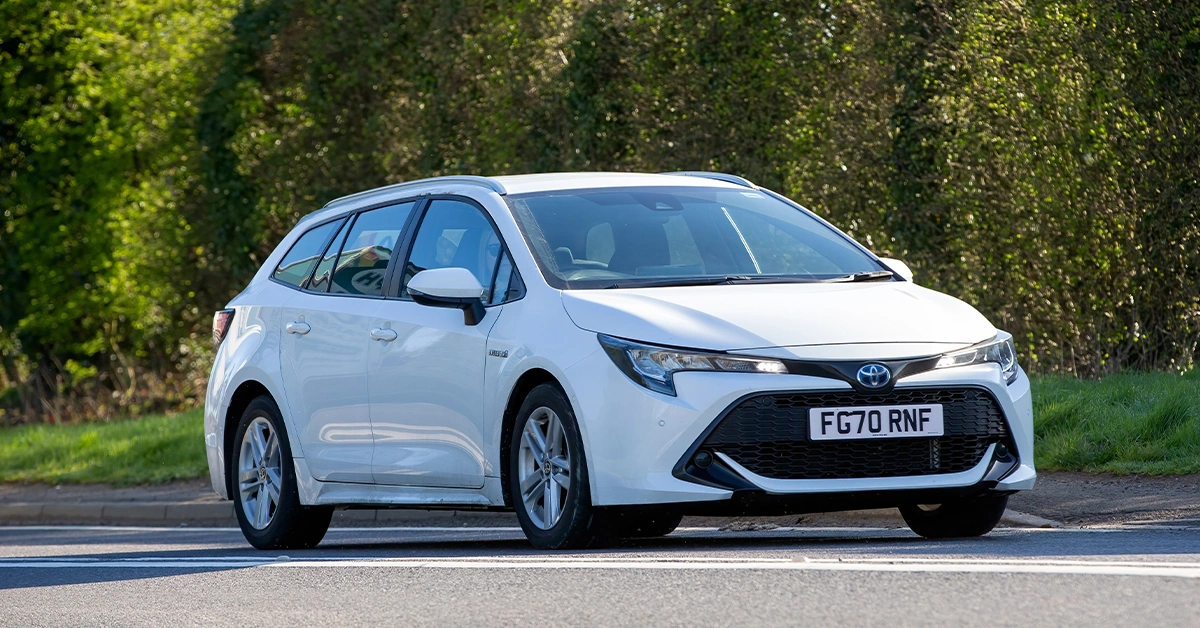Searching for a fuel-efficient car that doesn’t compromise on performance? Our comprehensive guide examines the most economical vehicles available in the UK market, from hybrids to diesels. We’ve analysed real-world data, user experiences, and long-term reliability reports to help you make an informed decision.
With vehicle prices climbing and living costs soaring, fuel economy has become a primary consideration for most buyers. The latest generation of hybrids, diesel engines and plugin vehicles offer impressive efficiency while maintaining driving pleasure.
This guide spans from compact city runners to family hatchbacks, each serving different needs while sharing outstanding fuel economy.
Today’s market offers more choice than ever, where hybrid technology, diesel efficiency, and innovative engineering need thorough consideration.
We’ve included vehicles that deliver consistently: impressive MPG figures, manageable running costs, and proven durability. Each model has demonstrated its worth through ownership data, maintenance records, and real-world efficiency testing.
Most Fuel-Efficient Cars In The UK:
Understanding Fuel Efficiency Compromises
Fuel-efficient vehicles have transformed dramatically over the past decade. While early models required significant trade-offs in performance and comfort, modern engineering has largely eliminated these compromises. Today’s efficient cars deliver both economy and capability, requiring only thoughtful matching of vehicle type to driving needs.
Common Fuel Efficiency Compromises:
- Expect to pay £2,000-5,000 more than equivalent conventional models, particularly for hybrids and plug-ins.
- Hybrid models often sacrifice 10-20% boot space to accommodate battery systems.
- Limited availability of qualified hybrid technicians outside main dealers, potentially increasing service and maintenance costs.
- Most efficient vehicles rated for 1,000-1,500kg versus 2,000kg+ for conventional models.
- Up to 20% efficiency loss in cold weather, particularly affecting hybrid battery performance
- Generally slower acceleration and reduced top speed compared to conventional engines of similar size
- More compact interior dimensions to achieve better aerodynamics
As we know small hybrids are the most fuel-efficient vehicles, and, as we know our users’ diverse needs we have categorised this list based on various vehicle categories for better selection.
Best Hybrid Cars With Excellent Fuel Economy UK
The following are the best hybrids with excellent fuel economy.
Toyota Prius Fourth Generation (2016-2022)
Average starting price: £200
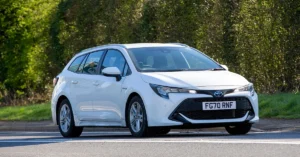
The 12th generation Toyota Corolla Hybrid represents a significant evolution in fuel-efficient motoring, achieving 62.8mpg through its refined hybrid powertrains.
Available with either a 120bhp 1.8-litre or a more potent 178bhp 2.0-litre hybrid system, this generation elevates the driving experience with smooth acceleration and exceptional refinement, particularly in urban environments where its electric-only operation shines.
Inside, this iteration of the Corolla distances itself from economy-focused stereotypes, offering premium materials and comprehensive technology including dual-zone climate control and adaptive cruise control, despite slightly limited rear legroom.
The 12th generation’s proven reliability record, supported by Toyota’s extensive dealer locations and expandable 15-year warranty, combined with class-leading running costs and strong residual values, establishes it as a standout choice in the hybrid family car segment.
Toyota Corolla Hybrid
Average starting price: £220
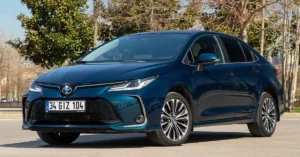
The 12th generation Toyota Corolla Hybrid represents a significant evolution in fuel-efficient motoring, achieving 62.8mpg through its refined hybrid powertrains.
Available with either a 120bhp 1.8-litre or a more potent 178bhp 2.0-litre hybrid system, this generation elevates the driving experience with smooth acceleration and exceptional refinement, particularly in urban environments where its electric-only operation shines.
Inside, this iteration of the Corolla distances itself from economy-focused stereotypes, offering premium materials and comprehensive technology including dual-zone climate control and adaptive cruise control, despite slightly limited rear legroom.
The 12th generation’s proven reliability record, supported by Toyota’s extensive dealer locations and expandable 15-year warranty, combined with class-leading running costs and strong residual values, establishes it as a standout choice in the hybrid family car segment.
Hyundai Ioniq Plugin, The First Generation (2016-2022)
Average starting price: £250
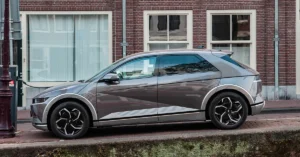
The Hyundai IONIQ Plug-in Hybrid (2016-2022) stands out as a practical approach to electrified motoring, offering an impressive 40-mile pure electric range and potential for 250+mpg when combining both power sources. The powertrain delivers nippy acceleration, particularly in urban environments, while maintaining smooth and quiet operation – addressing common hybrid refinement concerns.
Unlike some rivals like the Toyota Prius, the IONIQ successfully balances its eco-credentials with everyday practicality, featuring a spacious interior with good front and rear space, though the sloping roofline slightly compromises rear headroom.
Its strong reliability record and comprehensive equipment levels, including a 7-inch infotainment system and advanced driver aids, make it a compelling alternative to traditional hybrids, though the interior quality and technology package fall slightly behind class leaders.
Volkswagen Golf, MK7 (2013-2020)
Average starting price: £150
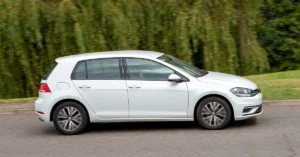
The Volkswagen Golf Mk7 (2013-2020) redefines efficiency in non-hybrid family cars, with the 1.5 TSI Evo 130 emerging as the standout choice, delivering an impressive 49.6mpg while addressing common efficiency compromises.
This sophisticated powertrain offers punchy performance and smooth power delivery, particularly noticeable in everyday driving conditions, while maintaining the Golf’s renowned ride comfort through its supple suspension system.
Inside, the Mk7 elevates above economy-focused rivals with premium materials and an intuitive 8.0-inch touchscreen system with Apple CarPlay and Android Auto integration, though rear space is slightly tight for taller passengers.
The SE Nav trim level provides the optimal balance of equipment and value, while strong residual values and reasonable servicing costs make it a sensible long-term car finance proposition, despite a higher initial purchase price than mainstream rivals like the Audi S3.
Skoda Octavia, MK2 (2004 -2013)
Average starting price: £200
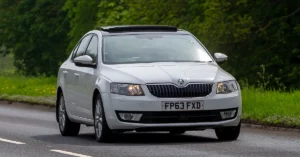
The second-generation Skoda Octavia (2004-2013) stands as a benchmark for practical fuel-efficient saloons, with the 1.6 TDI GreenLine variant emerging as the efficiency champion in the range.
This robust family car challenges typical economy car compromises through its blend of fleet-friendly running costs and exceptional practicality, featuring a massive 560-litre boot that expands to 1,350 litres with seats folded.
The common-rail (CR) diesel engines offer the optimal balance of smooth operation and frugal consumption, though the pre-2009 naturally aspirated petrol engines are less impressive.
For the best ownership experience, the SE (previously Ambiente) trim strikes the perfect balance with climate control, alloy wheels, and electric windows, while strong taxi and police fleet adoption validates its reliability credentials. Maintenance costs remain reasonable with fixed or variable servicing options (£149-£269), though timing belt changes are essential every four years or 75,000-130,000 miles.
Toyota Yaris, Third Generation (2011-2020)
Average starting price: £160
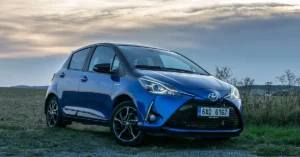
The third-generation Toyota Yaris (2011-2020) establishes itself as a sensible choice in the small car segment, with its 1.3-litre petrol engine delivering a balanced 58.9mpg while addressing common small car compromises.
The powertrain offers peppy performance suitable for both city and motorway driving, paired with a smooth-shifting five-speed manual gearbox that avoids the noise issues found in CVT variants.
Despite its compact exterior dimensions, the Yaris provides impressive interior space with plenty of rear passenger room and a completely flat floor, though boot space matches the Ford Fiesta rather than class leaders.
Strong reliability records and affordable maintenance costs through Toyota’s 5+ club make it a practical long-term proposition, while comprehensive TR/Icon trim levels include essential features like air conditioning and a reversing camera.
Renault Clio
Average starting price: £120
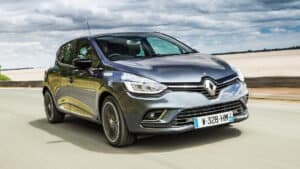
The latest generation Renault Clio combines striking design with exceptional efficiency, with the advanced 1.0 TCe 90 petrol engine achieving impressive real-world economy of 54-58mpg, while the newer E-Tech hybrid variants push this to 65mpg or beyond.
Engine options range from the efficient 1.0-litre three-cylinder turbo petrol to the sophisticated E-Tech hybrid system that pairs a 1.6-litre petrol engine with two electric motors and a unique multi-mode transmission, delivering exceptional refinement and responsiveness alongside outstanding fuel economy.
Inside, the Clio has evolved dramatically with a premium-feeling cabin featuring soft-touch materials, ambient lighting and a portrait-oriented infotainment display reminiscent of more expensive vehicles, while practical considerations include a best-in-class 391-litre boot that surpasses many vehicles from the segment above.
Renault’s improved reliability record is backed by a comprehensive 5-year warranty, while efficient engines, long service intervals, and competitive insurance classifications make the Clio among the most economical small cars to run, particularly in urban environments where the E-Tech hybrid model can operate in electric mode for up to 80% of city driving.
Fuel Efficient Cars: Maintenance & Running Costs
Modern fuel-efficient vehicles require different maintenance considerations depending on their powertrain. Hybrid vehicles typically need battery health checks but benefit from reduced brake wear due to regenerative braking. Diesel vehicles require attention to particulate filters but offer excellent longevity when properly maintained. Overall running costs often prove lower than those of conventional vehicles, particularly for high-mileage users.
Choosing The Right Fuel Efficient Car
Choosing the right fuel-efficient car depends heavily on your driving patterns. For primarily urban driving, hybrids excel. For long motorway journeys, modern diesels often prove more economical. Consider your annual mileage, typical journey types, and charging capabilities when making your selection.
Each vehicle category offers distinct advantages, but all deliver significant fuel savings without the compromises common in earlier efficient vehicles. Focus on matching the vehicle type to your specific needs rather than purely chasing the highest mpg figures.





